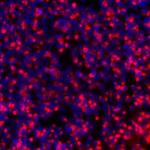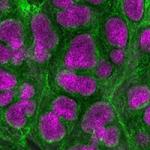
Research Topics
The generation of cellular diversity in the nervous system requires the specification and differentiation of a multitude of cell lineages from multipotent progenitor cells. The regulatory programs governing this process remain incompletely characterized, however, in part because of the difficulty in studying neuronal progenitor cells in their native environments. My lab uses the mammalian olfactory epithelium as a model for addressing this challenge.
Primary sensory neurons in the olfactory epithelium are continuously regenerated throughout adult life via the proliferation and differentiation of multipotent neural progenitor cells. Upon severe injury, these adult tissue stem cells are activated and go on to reconstitute all of the cellular constituents of this sensory epithelium. The regenerative capacity of the olfactory epithelium therefore presents a powerful and experimentally accessible paradigm for elucidating the mechanisms regulating neural stem-cell function.
We are using a variety of approaches to unravel the molecular and cellular mechanisms regulating olfactory stem cells and olfactory neurogenesis in the mouse. For example, we use conditional genetic knockouts to investigate the roles of certain transcription factors and intracellular signaling pathways in promoting stem-cell self-renewal, proliferation, and differentiation.
As a complementary approach, we also apply single-cell transcriptomic and single-cell epigenomic analyses to identify the genetic and epigenetic programs that both define and regulate olfactory neurogenesis during regeneration.
Our studies provide a model for understanding the mechanisms regulating neural stem cells and lay the groundwork for the future development of treatments and therapeutics to ameliorate tissue damage and degeneration in the nervous system.
Biography
John J. Ngai, Ph.D., is the Director of the NIH's Brain Research through Advancing Innovative Neurotechnologies (BRAIN®) Initiative. Dr. Ngai earned his bachelor's degree in chemistry and biology from Pomona College, Claremont, California, and Ph.D. in biology from the California Institute of Technology (Caltech) in Pasadena. He was a postdoctoral researcher at Caltech and at the Columbia University College of Physicians and Surgeons before starting his faculty position at the University of California at Berkeley. During more than 25 years as a Berkeley faculty member, Dr. Ngai has trained 20 undergraduate students, 24 graduate students and 15 postdoctoral fellows in addition to teaching well over 1,000 students in the classroom. His work has led to the publication of more than 70 scientific articles in some of the field's most prestigious journals and 10 U.S. and international patents. Dr. Ngai has received many awards including from the Sloan Foundation, Pew Charitable Trusts, and McKnight Endowment Fund for Neuroscience. As a faculty member, Dr. Ngai has served as the director of Berkeley's Neuroscience Graduate Program and Helen Wills Neuroscience Institute. He has also provided extensive service on NIH study sections, councils and steering groups, including as previous co-chair of the NIH BRAIN® Initiative Cell Census Consortium Steering Group. Dr. Ngai oversees the long-term strategy and day-to-day operations of the NIH BRAIN Initiative as it takes on the challenges of the next five year plan.
Education: Pomona College, Claremont, California (B.A. in chemistry and zoology); Harvard Medical School, Boston (Program on Cell and Developmental Biology); California Institute of Technology, Pasadena, California (Ph.D. in biology)
Training: Postdoctoral fellow, California Institute of Technology and Howard Hughes Medical Institute/Columbia University College of Physicians and Surgeons (New York)
Before coming to NIH: Professor of Neurobiology, Department of Molecular and Cell Biology, and Coates Family Professor of Neuroscience, Helen Wills Neuroscience Institute, University of California at Berkeley (Berkeley, California)
Came to NIH: In 2020
Outside interests: Doing photography; enjoying food and wine
Selected Publications
- Ben-Simon Y, Hooper M, Narayan S, Daigle TL, Dwivedi D, Way SW, Oster A, Stafford DA, Mich JK, Taormina MJ, Martinez RA, Opitz-Araya X, Roth JR, Alexander JR, Allen S, Amster A, Arbuckle J, Ayala A, Baker PM, Bakken TE, Barcelli T, Barta S, Bendrick J, Bertagnolli D, Bielstein C, Bishwakarma P, Bowlus J, Boyer G, Brouner K, Casian B, Casper T, Chakka AB, Chakrabarty R, Chance RK, Chavan S, Clark M, Colbert K, Collman F, Daniel S, Departee M, DiValentin P, Donadio N, Dotson N, Egdorf T, Fliss T, Gabitto M, Garcia J, Gary A, Gasperini M, Gloe J, Goldy J, Gore BB, Graybuck L, Greisman N, Haeseleer F, Halterman C, Haradon Z, Hastings SD, Helback O, Ho W, Hockemeyer D, Huang C, Huff S, Hunker A, Johansen N, Jones D, Juneau Z, Kalmbach B, Kannan M, Khem S, Kussick E, Kutsal R, Larsen R, Lee C, Lee AY, Leibly M, Lenz GH, Li S, Liang E, Lusk N, Madigan Z, Malloy J, Malone J, McCue R, Melchor J, Mollenkopf T, Moosman S, Morin E, Newman D, Ng L, Ngo K, Omstead V, Otto S, Oyama A, Pena N, Pham T, Phillips E, Pom CA, Potekhina L, Ransford S, Ray PL, Rette D, Reynoldson C, Rimorin C, Rocha D, Ruiz A, Sanchez REA, Sawyer L, Sedeno-Cortes A, Sevigny JP, Shapovalova N, Shepard N, Shulga L, Sigler AR, Siverts L, Soliman S, Somasundaram S, Staats B, Stewart K, Szelenyi E, Tieu M, Trader C, Tran A, van Velthoven CTJ, Walker M, Wang Y, Weed N, Wirthlin M, Wood T, Wynalda B, Yao Z, Zhou T, Ariza J, Dee N, Reding M, Ronellenfitch K, Mufti S, Sunkin SM, Smith KA, Esposito L, Waters J, Thyagarajan B, Yao S, Lein ES, Zeng H, Levi BP, Ngai J, Ting JT, Tasic B. A suite of enhancer AAVs and transgenic mouse lines for genetic access to cortical cell types. Cell. 2025;188(11):3045-3064.e23.
- BRAIN Initiative Cell Census Network (BICCN). A multimodal cell census and atlas of the mammalian primary motor cortex. Nature. 2021;598(7879):86-102.
- Yao Z, Liu H, Xie F, Fischer S, Adkins RS, Aldridge AI, Ament SA, Bartlett A, Behrens MM, Van den Berge K, Bertagnolli D, de Bézieux HR, Biancalani T, Booeshaghi AS, Bravo HC, Casper T, Colantuoni C, Crabtree J, Creasy H, Crichton K, Crow M, Dee N, Dougherty EL, Doyle WI, Dudoit S, Fang R, Felix V, Fong O, Giglio M, Goldy J, Hawrylycz M, Herb BR, Hertzano R, Hou X, Hu Q, Kancherla J, Kroll M, Lathia K, Li YE, Lucero JD, Luo C, Mahurkar A, McMillen D, Nadaf NM, Nery JR, Nguyen TN, Niu SY, Ntranos V, Orvis J, Osteen JK, Pham T, Pinto-Duarte A, Poirion O, Preissl S, Purdom E, Rimorin C, Risso D, Rivkin AC, Smith K, Street K, Sulc J, Svensson V, Tieu M, Torkelson A, Tung H, Vaishnav ED, Vanderburg CR, van Velthoven C, Wang X, White OR, Huang ZJ, Kharchenko PV, Pachter L, Ngai J, Regev A, Tasic B, Welch JD, Gillis J, Macosko EZ, Ren B, Ecker JR, Zeng H, Mukamel EA. A transcriptomic and epigenomic cell atlas of the mouse primary motor cortex. Nature. 2021;598(7879):103-110.
- Brann DH, Tsukahara T, Weinreb C, Lipovsek M, Van den Berge K, Gong B, Chance R, Macaulay IC, Chou HJ, Fletcher RB, Das D, Street K, de Bezieux HR, Choi YG, Risso D, Dudoit S, Purdom E, Mill J, Hachem RA, Matsunami H, Logan DW, Goldstein BJ, Grubb MS, Ngai J, Datta SR. Non-neuronal expression of SARS-CoV-2 entry genes in the olfactory system suggests mechanisms underlying COVID-19-associated anosmia. Sci Adv. 2020;6(31).
- Das D, Fletcher RB, Ngai J. Cellular mechanisms of epithelial stem cell self-renewal and differentiation during homeostasis and repair. Wiley Interdiscip Rev Dev Biol. 2020;9(1):e361.
Related Scientific Focus Areas





Molecular Biology and Biochemistry
View additional Principal Investigators in Molecular Biology and Biochemistry
This page was last updated on Saturday, August 30, 2025